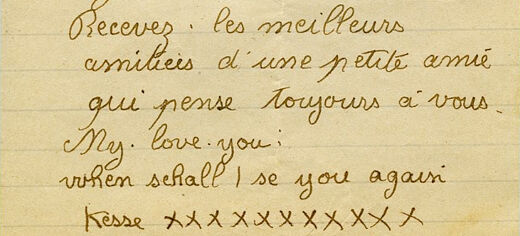
A touching love letter from a young Frenchwoman to her sweetheart Tommy at the front has been unearthed by the University of Leeds.
It was St Valentine’s Day, 1916. Preparations were already underway for the Battle of the Somme, which with more than a million casualties was one of bloodiest in history.
In a touching mixture of faltering English and polite French, Eleonore Aneelle, a cafe owner’s daughter from a tiny Somme village, put pen to paper in a love letter to Private James Ivan “Jimmy” Menzies, a member of the King's Own (Royal Lancaster) Regiment who had either been billeted at the cafe or was a regular visitor there.
“I think of you always, and send you my very best wishes,” she wrote, in a letter bequeathed to the University of Leeds’ Liddle Collection of private papers of those who lived through the First World War. “When shall I see you again?”
History does not tell us if the romance blossomed.
Jimmy Menzies, who had signed up at 18, not long after war broke out, was badly wounded in the Battle of the Somme in August, 1916. He performed in concert parties during the remainder of the war and was discharged before the armistice was signed.
Alison Fell, Professor of French Cultural History at the University of Leeds, is heading up its Legacies of War centenary research and public engagement project.
She said: “In the months leading up to the Somme offe nsive in 1916, Allied soldiers were regularly billeted in the village, and as a result many inhabitants set up ‘estaminets’ selling alcohol and food to the troops.
“Military authorities were concerned about relationships between troops and local French girls – prostitution was common, of course – but good friendships and relationships between soldiers and civilian French women were also struck up, usually in a stilted mixture of French and English.
“Menzies, as a Private, would have been unlikely to have spoken that much French and the French girls, equally, had very little English. He seems to have known her parents as well as her, so this seems to me to have been a chaste – and probably fleeting – romance.”
Menzies went on to become a singer and actor, famous for his comic baritone roles with the D’Oyly Carte Opera Company in the 1920s. In 1923 he married fellow D’Oyly Carte singer Elsie Griffin, who had entertained British troops in France during the war, popularising songs such as Danny Boy and Roses of Picardy in the trenches.
Menzies and Griffin’s daughter, Mahala Menzies, who donated her father’s papers to the University of Leeds archives, said her father had not talked much to her about the war and had never mentioned his “petite amie” from Berteaucourt les Dames.
“I’m sure there was never anything beyond some kind words as far as their relationship went,” said Miss Menzies, 85, who lives in Blackheath, London.
The letter translated
Dear friend
I’m answering your letter that I received this morning, it gave me great pleasure to hear that you’re well; I am also well, as are all the family. I think of you always, and send you my very best wishes. If you are in Candas as you said I hope you will come and see us, as it’s not very far from us. Next time you can send me more details. My parents send their best wishes and say hello.
With best wishes from a girlfriend who thinks of you always.
My love you [sic]
When shall I se [sic] you again
Kisse xxxxxxxxxxx
Hoping to get some good news from you soon.
Eleonore Aneelle, Café de la Poste, Berteaucourt-les-Dames, Somme.
Further information
Professor Alison Fell is available for interview through the University of Leeds press office: 0113 343 3996 or g.j.dant@.leeds.ac.uk.
The Liddle Collection includes the personal papers of more than 4,000 people who lived through the First World War.
For those wanting to find out more, the best place to start is online, via: library.leeds.ac.uk/special-collections-liddle-collection. There you can search the archive using keywords to find items worthy of a closer look.
Any individual can pay a visit to look at items in the collection, although non-members of the University of Leeds are asked to make an appointment in advance, via specialcollections@library.leeds.ac.uk or 0113 343 5518.